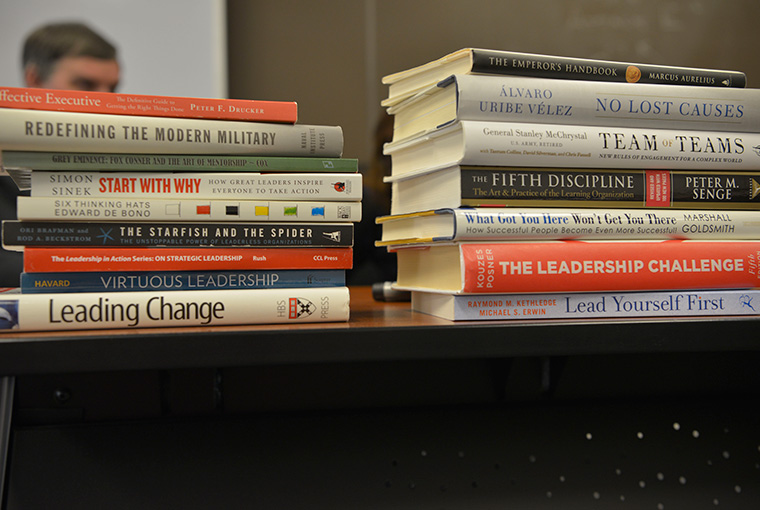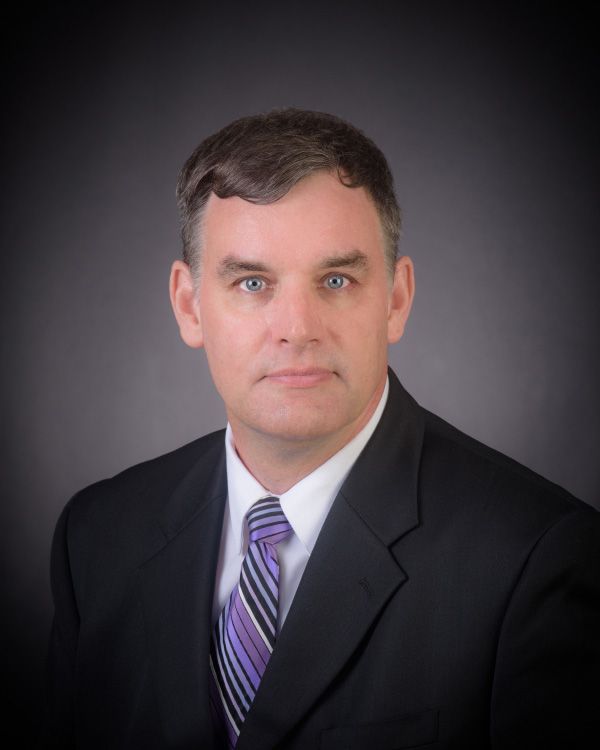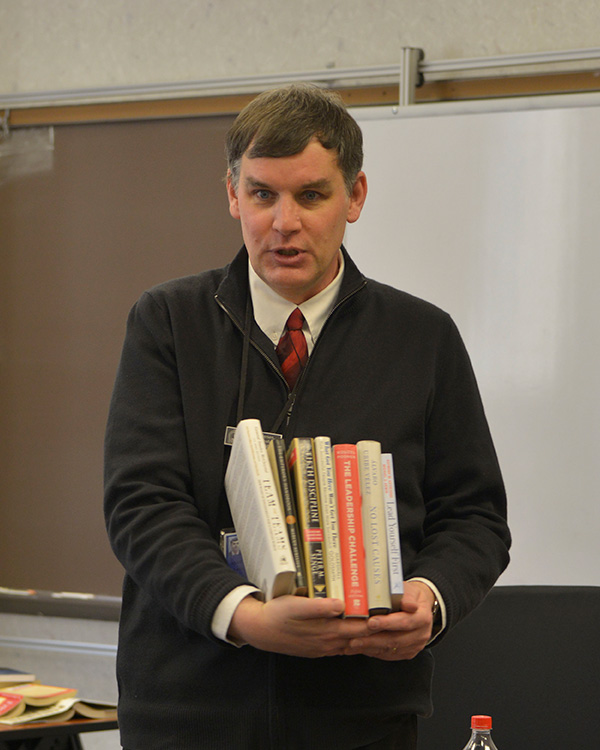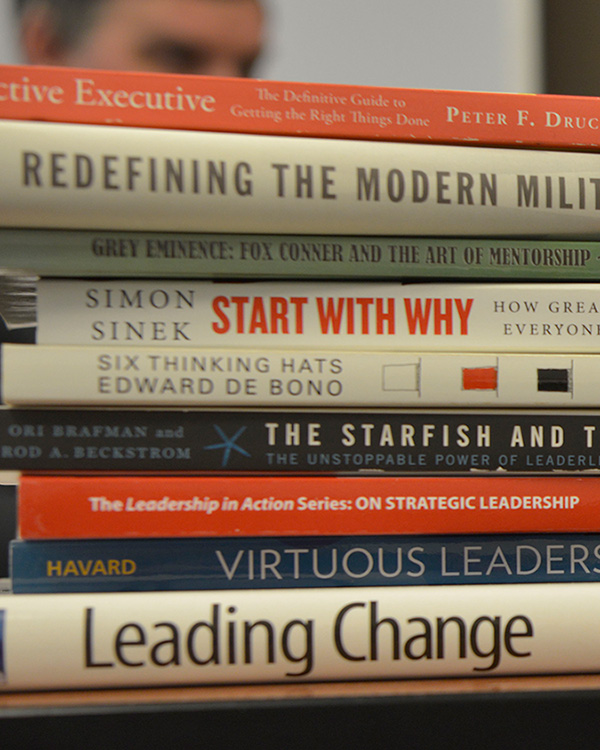At 1-year Mark, College of Leadership and Ethics Officials Talk About Teaching Officers How to Lead – Plus What They Are Reading

In April 2018, a directive from the top of the U.S. Navy launched a new academic department at U.S. Naval War College. The College of Leadership and Ethics was created to provide a new home for an expanding Navy leadership curriculum.
Dean Peg Klein and associate professor Gene Andersen sat down recently to talk about the accomplishments of the first year, what’s coming next and what Navy leaders should be thinking about and reading.
Q: How did the College of Leadership and Ethics come to be formed a year ago?

Dean Peg Klein, College of Leadership and Ethics
(U.S. Navy photo by Edwin Wriston)
Klein: Chief of Naval Operations Adm. John Richardson has a distinct view. He understands that we are required to be technically competent, but he also understands the role of character.
The reason this department was created is that he sees competence and character as equally fundamental to the job of being a Navy leader.
Andersen: The longer version of the story begins in 2006, when the president of the college hired a dean of leadership for the first time. We were given an open-ended charge to think about leadership and leader development across the [U.S.] Navy and the college’s role in that.
We started with research projects focused on two- and three-star admirals. A student research project ran for six years, from 2007 to 2012, which led us to discover a series of eight gaps in leader development for senior Navy leaders.
What we’ve done since then has been focused on what we can do to close some of those gaps. They are:
- self-awareness
- innovativeness
- cross-cultural adeptness
- critical thinking
- broadened perspectives
- unity of effort without unity of command
- adaptability
- flexibility
Those are areas that officers said they did not get enough development in prior to those jobs.
Klein: Out of that list came many of the electives we are teaching and also many of the hires. We picked up people along the way who had been developing expertise in one of these eight areas.
Q: What were your two or three major accomplishments in the first year?
Klein: We delivered our second course for two-star flag officers, delivered our first course for three-star officers, and we are finishing up delivering the Leadership in the Profession of Arms course to the whole student body.

Dean Klein in College of Leadership and Ethics course
(U.S. Navy photo by Jeanette Steele/Released)
So to explain, it’s a common practice in the best businesses that they invest in their executives. The [U.S.] Navy had a course for one-star officers, and there were a few people who they’d send off to Singularity University or Harvard’s Kennedy School of Government. But the Navy didn’t have its own organic answer.
Andersen: We call the course for two-star officers Partners in the Navy Profession, because the vice chief of naval operations wants the two stars to think of themselves as the owner-operators of the Navy.
The course covers the difference between complicated problems and complex problems – and understanding that complexity is different than complication. It requires different thinking and different approaches.
The course for three-star officers is called Navigating Uncharted Waters, and it’s about how do you deal with ambiguity and the unknown.
At the three-star level, our research shows that a characteristic of those jobs is you’re having to answer questions that there are no known answers to – and there may not be useful subject-matter experts. You have to learn to think differently. You have to learn to ask the right questions, because it’s not obvious what the right answers are.
Klein: As for our Leadership in the Profession of Arms course, from 2006 to now, we’ve been delivering leadership electives. What we started in August 2018 was a fourth core course.
The first year, we taught it once a month to the whole student body, in 12- to 14-person seminars. We took the best of each of the electives that we had delivered and wove them together into this course that looks at leadership through the lens of the profession.
Q: What’s going to be new in year two?
Klein: We have a new delivery model for the Leadership in the Profession of Arms course in the next academic year.
For students, it will be a much more immersive environment in that they will get it every Wednesday or Thursday afternoon for 10 weeks straight – as opposed to once a month throughout the academic year.

Associate professor Gene Andersen, College of Leadership and Ethics
(U.S. Navy photo by Edwin Wriston)
For flag officers, the content that we deliver now to two stars, we are trying to move that to a couple years earlier in flag officer careers. So we will likely in the next year deliver a one-star course. And we are working with each of the navy communities – surface warfare, submarines and aviation, for example – to help them build their leader development strategies.
Andersen: Over the last one and a half years, we’ve had the opportunity to do some executive coaching with over 125 of the Navy’s admirals. We will continue coaching.
In our second year, we want to catch them earlier, as they make flag, or are promoted to two stars and do this two- to three-hour coaching session with them then.
Q: If I’m a mid-level Navy manager, what are the three things I need to know to improve my leadership skills right now?
Klein: What I would say to any midlevel officer or middle manager is, to be a good leader, self-awareness is key to almost everything else you do.
Leaders have to influence, and to influence they have to communicate, to communicate they have to know not just who they are but how other people receive them.
There are many models that say humility is also very important, because you have to understand that you may or may not be the smartest person in the room. Many times, when we promote people, their thinking is “I was promoted because I’m the smartest person in this area.” Helping people train their brains that that might not be the case is incredibly important.
 Gene Andersen in College of Leadership and Ethics course
Gene Andersen in College of Leadership and Ethics course(U.S. Navy photo by Jeanette Steele/Released)
The third thing people need – that doesn’t come when you study how to fly a plane, or how to drive a ship or submarine – is empathy.
They have to have empathy to understand what they telling people to do – not just how it’s going to be received but how it is going to be executed. Understanding how people receive your orders is incredibly important.
A fourth thing would be understanding “command and control” leadership, as opposed to a more collaborative, thoughtful, transformational leadership ideology.
There’s a time and a place for command and control, and it’s usually when you are getting fired upon. It is a very industrial-age model. As people understand how to work with a team and how to develop a team, there is not a need to have a command and control leadership style 24/7.
Q: What are some leadership books that people should be reading now?
Andersen: The book that’s driving some stuff we are thinking about now is Finney and Mayfield’s “Redefining the Modern Military: The Intersection of Profession and Ethics.”
 Stack of Leadership books found in a College of Leadership and Ethics course
Stack of Leadership books found in a College of Leadership and Ethics course(U.S. Navy photo by Jeanette Steele/Released)
This book is about why do we do what we do, what does it mean to be us and why does that matter in what we do as members of the military. Because senior leaders have to be able to answer the question – and to drive the message on – why is this job worth your time, your energy, your sweat and maybe your blood.
Klein: I would tell you that “Humility Is the New Smart” by Edward Hess and Katherine Ludwig, reinforces the need for humility. They talk about the need for humility, in the sense that you need to be realistic about what your strengths are and how you interface in this smart-machine age.
A classic favorite of mine is Carol Dweck’s “Mindset.” There are plenty of studies out there – and there are books about grit and the Navy talks about resilience and toughness – and a lot of that is contained in this book about the new psychology of success.
